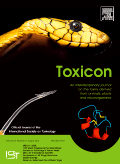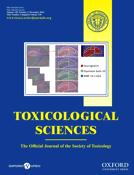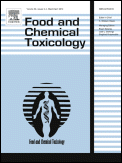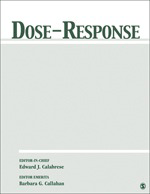
Toxins
metrics 2024
Empowering the global community with vital toxicology research.
Introduction
Toxins, published by MDPI, is a leading open-access journal specializing in the field of toxicology, with a strong emphasis on the health implications of toxins across various environments. Established in 2009, this journal has quickly ascended to prominence, attaining a Q1 ranking in both the Health, Toxicology and Mutagenesis and Toxicology categories, underscoring its significant contribution to the scientific community. With an impressive Scopus ranking, placing it within the top percentile of related fields, Toxins serves as a vital resource for researchers, professionals, and students dedicated to advancing knowledge in toxicology and environmental health. The journal encourages the open dissemination of innovative research and critical reviews that explore the mechanisms, effects, and management of toxic substances, thus ensuring that vital research outcomes reach a global audience. For those looking to keep abreast of cutting-edge developments in the field, Toxins is an indispensable platform for scientific exchange and collaboration.
Metrics 2024
 -
- 3.90
3.90 4.20
4.20 -
-Metrics History
Rank 2024
IF (Web Of Science)
JCI (Web Of Science)
Quartile History
Similar Journals

Journal of Environmental Science and Health Part C-Toxicology and Carcinogenesis
Transforming Environmental Insights into Health SolutionsThe Journal of Environmental Science and Health Part C-Toxicology and Carcinogenesis is a vital publication in the fields of environmental science, toxicology, and cancer research, published by Taylor & Francis Inc. With an ISSN of 2689-6583 and E-ISSN 2689-6591, this journal provides a platform for peer-reviewed research that explores the intersection of environmental factors and health outcomes, particularly focusing on toxicological and carcinogenic impacts. Though it does not currently offer Open Access, it remains a significant contributor to academia with its current ranking in the Q4 category for Cancer Research and Q3 in Health, Toxicology and Mutagenesis. The journal has converged from 2020 to 2024 and aims to disseminate pioneering studies that inform public health policies and foster a deeper understanding of environmental toxins. Aspiring researchers, professionals, and students will find this journal to be an essential resource for the latest findings and discussions within these critical fields.

TOXICON
Innovative Insights into Toxicology and BeyondTOXICON is a prominent peer-reviewed journal dedicated to advancing the field of toxicology and its related disciplines. Published by PERGAMON-ELSEVIER SCIENCE LTD, this journal has been a crucial resource for researchers since its inception in 1962, with a focus on disseminating high-quality research until 2024 and beyond. TOXICON features comprehensive studies spanning the biochemical, biochemical, and regulatory aspects of toxology, making it essential for researchers, professionals, and students alike. With a current impact factor that places it in the Q3 category of Toxicology and a Scopus rank of 67 out of 133 in its field, it serves as a valuable platform for innovative findings and discussions. Although it does not offer open access options, TOXICON's rigorous editorial standards ensure that published work meets the highest scholarly criteria, thereby enhancing its contribution to toxicological science.

TOXICOLOGICAL SCIENCES
Unraveling Toxicity to Safeguard Our FutureTOXICOLOGICAL SCIENCES, published by Oxford University Press, is a premier journal in the field of toxicology that has been a cornerstone of scientific discourse since its inception in 1981. With an impressive 2023 impact factor and ranked in the Q1 category for Toxicology, this journal is highly regarded among researchers, professionals, and students dedicated to pharmacology and toxicology. The journal is committed to advancing the understanding of toxicological science, covering a breadth of topics that include the mechanisms of toxicity, risk assessment, and the regulatory aspects affecting public health. With an ISSN of 1096-6080 and an E-ISSN of 1096-0929, TOXICOLOGICAL SCIENCES facilitates open access scholarly work, ensuring that critical research reaches a global audience and promotes collaborative learning. As it converges towards 2024, the journal remains pivotal in shaping the future of toxicology research, providing insights that are essential for developing safer chemicals and protecting environmental health.

Journal of Biological Research-Thessaloniki
Advancing Biological Frontiers from Thessaloniki.Journal of Biological Research-Thessaloniki, published by Aristotle University of Thessaloniki, is a distinguished academic journal committed to advancing the fields of Agricultural and Biological Sciences and Biochemistry, Genetics and Molecular Biology. As an Open Access journal since 2004, it provides a platform for the rapid dissemination of innovative research that spans diverse biological disciplines. With an impact factor that situates it in the Q2 category for Agricultural and Biological Sciences and Q3 for Biochemistry, Genetics and Molecular Biology as of 2023, the journal demonstrates a significant contribution to its respective fields. Located in Thessaloniki, Greece, it serves a global audience of researchers, professionals, and students eager to access quality scientific content. The journal is dedicated to publishing original research articles, reviews, and critical commentaries, encouraging collaboration and dialogue amongst scientists dedicated to the frontiers of biological research.

ARCHIVES OF TOXICOLOGY
Illuminating the Path in Toxicology and HealthARCHIVES OF TOXICOLOGY is a prestigious journal published by Springer Heidelberg, dedicated to advancing research in the field of toxicology and related disciplines. With a distinguished history dating back to 1930, this journal has continuously provided vital insights and groundbreaking studies, making it a cornerstone in the areas of health, toxicology, and medicine. Recognized for its high impact, it occupies a top-ranking position in Scopus, with remarkable quartile placements in 2023, categorizing it as Q1 in Health, Toxicology and Mutagenesis, and Q1 in Medicine (Miscellaneous). The journal highlights critical research and innovative methodologies, appealing to a diverse audience of researchers, professionals, and students committed to understanding the complexities of toxic substances and their implications for public health and environmental safety. The journal does not currently offer open access, allowing for a more traditional but rigorous peer-review process that ensures the quality and integrity of every published article. Join the global discourse in toxicological science with ARCHIVES OF TOXICOLOGY, where every contribution furthers the understanding of safety and toxicity in our world.

TOXICOLOGY
Leading the way in understanding toxic risks and safety measures.TOXICOLOGY, published by Elsevier Ireland Ltd, is a prestigious peer-reviewed journal specializing in the field of toxicology. With an ISSN of 0300-483X and an E-ISSN of 1879-3185, this journal provides a vital platform for researchers, professionals, and students to disseminate and access groundbreaking studies from 1973 to present, with a convergence set until 2024. Recognized for its high impact, it holds a Q1 ranking in Toxicology category and ranks #18 out of 133 in Scopus's sector of Pharmacology, Toxicology, and Pharmaceutics, placing it in the 86th percentile. While the journal is not open access, it nonetheless offers a rich collection of research articles that enhance the understanding of toxicological science and its applications. The journal's objectives encompass advancing knowledge in the toxicological evaluation of substances, promoting safety in public health, and fostering dialogue among scholars. As a key resource in the field, TOXICOLOGY plays a crucial role in advancing research and informing practices related to toxicological risks and safety assessments.

FOOD AND CHEMICAL TOXICOLOGY
Bridging disciplines for a healthier tomorrow.FOOD AND CHEMICAL TOXICOLOGY, published by Pergamon-Elsevier Science Ltd, is a prestigious journal with a significant impact in the fields of food science, medicine, and toxicology, reflecting its Q1 and Q2 quartile rankings in various categories as of 2023. Established in 1982, this journal continues to serve as an essential platform for disseminating high-quality research focused on the toxicological assessment of foods and chemicals, aiming to advance knowledge that affects public health and safety. With a pivotal role in integrating diverse disciplines, including pharmacology and agricultural sciences, the journal ranks impressively within the top percentiles—specifically 95th in Toxicology and 92nd in Food Science on the Scopus metrics. Though it operates on a traditional subscription model, the journal is committed to providing valuable insights and findings to researchers, professionals, and students across the globe, making it a vital resource in the ongoing discourse around food safety and environmental health. Its comprehensive scope underscores its importance in shaping evidence-based policies and practices.

Frontiers in Toxicology
Championing Open Access in Toxicological StudiesFrontiers in Toxicology, published by Frontiers Media SA, is a prominent open-access journal dedicated to advancing the understanding of toxicological science. Established in 2019, it serves as a vital forum for innovative research, offering insights into the pharmacological impacts and toxicological profiles of various substances. With its international reach based in Switzerland, this journal has quickly ascended in the academic community, achieving a notable Q1 ranking in Pharmacology, Toxicology and Pharmaceutics (Miscellaneous) and a Q2 ranking in Toxicology as of 2023. The journal is indexed in Scopus, where it ranks #8 out of 43 in its primary category, underscoring its influence and relevance in the field. The scope encompasses cutting-edge studies on the mechanisms of toxicity, including both human and environmental impacts, making it an essential resource for researchers, professionals, and students alike. By promoting open access to high-quality research, Frontiers in Toxicology plays a crucial role in enhancing knowledge sharing and fostering collaboration across disciplines.

Toxics is a leading international journal published by MDPI that has been dedicated to advancing the knowledge in the fields of toxicology, environmental health, and chemical safety since its inception in 2013. With an impressive Open Access model, it ensures that all research findings are readily available to a global audience, fostering collaboration and innovation across academia and industry. The journal is esteemed for its rigorous peer-review process and holds notable rankings, including Q1 status in Chemical Health and Safety and Q2 in both Health, Toxicology and Mutagenesis and Toxicology, reflecting its impact on critical research areas. Based in Basel, Switzerland, Toxics provides a platform for researchers, professionals, and students to disseminate significant findings on the implications of toxic substances in health and the environment, aiming to improve public health outcomes and inform regulatory decisions. With its ongoing commitment to high-quality research and relevant access options, Toxics continues to be an essential resource in the domain of toxicology and environmental sciences.

Dose-Response
Bridging Knowledge Gaps in Dose-Response AnalysisWelcome to Dose-Response, a premier open-access journal published by SAGE Publications Inc., dedicated to advancing the understanding of dose-response relationships in chemical exposure, health, toxicology, and public health. Established in 2003, this journal has quickly become an invaluable resource for researchers and professionals in the fields of public health, environmental science, and toxicology, boasting a commendable impact factor and a notable ranking in multiple categories, including Q2 in Public Health and Environmental and Occupational Health. With its converged years stretching from 2008 to 2024, Dose-Response aims to publish high-quality articles that contribute to the evaluation of health risks and benefits, ensuring that essential research reaches a global audience. Its open-access model provides unrestricted access to groundbreaking studies, fostering collaborative efforts among scientists and practitioners to inform policy and improve public health outcomes.